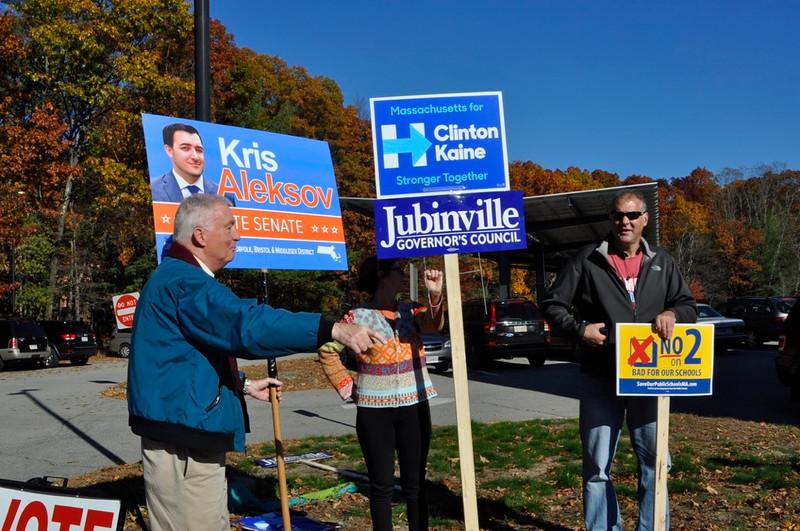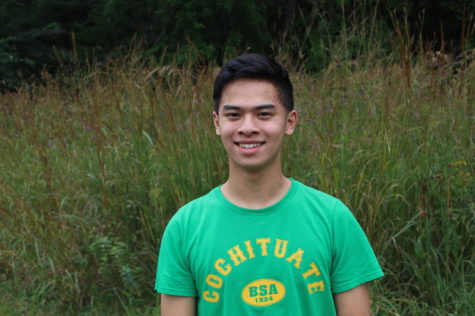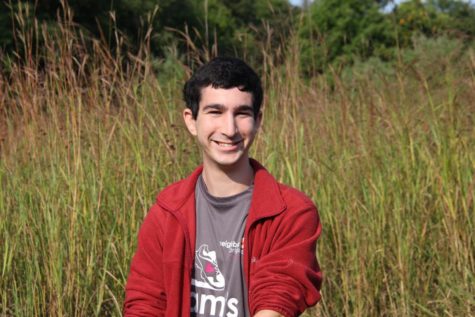On Election Day, Wayland residents head to the polls
Above, Wayland residents Rodney Hager, Martha Locke and Anthony Dias hold political signs outside Wayland Middle School. Wayland voters cast their ballots in the U.S. presidential election on Tuesday. “Every vote counts. All it takes is one,” Psiaf said.
November 9, 2016
On Tuesday afternoon, Wayland residents converged on the polls to choose America’s next president. Local political activists were out in force holding signs near polling places, and among those casting their ballots were WHS students and teachers.
Outside Wayland Middle School, where precincts 2 and 3 vote, a trio of campaigners stood holding large banners that sat atop wooden posts. Two of the signs bore the names of Democratic candidates, while the third read “Vote No on Question 2.”
Martha Locke, who held a sign that supported Democratic presidential candidate Hillary Clinton and Democratic candidate for governor’s council Bob Jubinville, explained that she carried her sign partly because she is a member of the Wayland Democratic Town Committee and partly for other reasons.
“Some voters go into the voting booth and they’re undecided, which seems odd to me, but I understand that,” Locke said. “Perhaps [holding a sign] is just a nudge for people who are undecided.”
Rodney Hager, also a member of the Wayland Democratic Town Committee, spent part of his day holding a sign for Democratic state senate candidate Kris Aleksov for similar reasons.
“I hope that people who may not know this candidate will remember the name when they go in and see the ballot,” Hager said. “I want to see Democrats elected.”
Hager also expressed support for Clinton and disgust for Republican presidential candidate Donald Trump.
“I’ve never heard [Clinton] talk about a wall or extreme vetting for people who are not white, and it’s just appealing to the lowest possible level of people,” Hager said, referring to Trump’s proposals to build a wall along the U.S.-Mexico border and temporarily ban Muslim immigrants from entering the country. “We’re much better than that as a people, as a country.”
“[I support Clinton because she is] extremely qualified. I like the fact that she thinks before she speaks. I like the fact that she understands complex issues,” Locke said.
Near Locke and Hager, Anthony Dias held a sign opposing the second question on the Massachusetts state referendum ballot. If passed, the question would authorize either up to 12 new charter schools in Massachusetts or enrollment expansions in existing charter schools.
“[Passing question two would] affect quite a few cities and towns throughout the state. It’s a $400 million loss [for public schools] if this passes,” Dias said.
Dias works for the Massachusetts Teachers Association, a union with more than 110,000 members throughout the state. He said that he had come to the middle school as part of his job with the union.
“There are some 800 people around the state who are doing this for this question, and as many or more on the other side of the question,” Dias said. “You hope that you change that last single vote. Every vote counts. All it takes is one.”
Yard signs on Main Street, where the middle school is located, expressed various political views. One front lawn across the street from the middle school sported four Clinton campaign signs. A plywood sign nearby read, “Lock Her Up,” referring to accusations of corruption aimed at Clinton.
At the town building, where precincts one and four vote, a similar scene unfolded. Heidi Heilman held a sign saying no on the fourth question on the state referendum ballot. If passed, question four would allow the Massachusetts government to legalize and regulate recreational marijuana.
“If I can capture any undecided votes through a sign I am holding, I’ll do it. I am that passionate about this issue,” Heilman said. “It’s going to be a game changer for our next generation.”
Heilman expressed faith that Massachusetts voters would reject the referendum.
“I am holding on to hope that even if this does pass, which I am really hoping won’t happen, that the universe has a plan, and hands will all come together for a greater good,” Heilman said.
Massachusetts residents have been engaged in a fierce debate over the pros and cons of legalizing recreational marijuana since voting to legalize medical marijuana in 2012.
Inside the town building, the voting process was busy but ran smoothly.
“It wasn’t crowded. They were ready for crowds, but I guess it [hadn’t] gotten crowded yet. It was serious and mostly happy. Every time I go vote, people seem pretty happy about exercising their civic rights,” WHS science teacher Ken Rideout said. Rideout voted for Clinton.
WHS senior Coby Sommerfield, voting for Libertarian presidential candidate Gary Johnson, had a similar experience.
“It went faster than I expected it to. You bubble in your votes and put it the machine and then you leave. It was all very quick,” Sommerfield said. “It was actually pretty calm. It was almost business like in a way. The people who were working there are nice and get you through everything as quickly as possible.”





![Last Wednesday, the Wayland School Committee gathered to discuss a number of topics regarding the health curriculum and Innovation Career Pathway course. Another large topic of conversation was the ways to potentially mitigate distracting cell phone usage. "These [phones] are going to distract your learning and social relationships," Superintendent David Fleishman said. "That's concrete right there."](https://waylandstudentpress.com/wp-content/uploads/2025/06/Screenshot-2025-06-04-at-9.49.31 PM-1200x886.png)



























![Troy Hoyt finishes the Boston Marathon, running for the Hoyt Foundation. T. Hoyt is the son of Hoyt Foundation CEO Russ Hoyt.
“[Running a marathon] might seem like a big thing, when it’s presented to you at first, but if you break it up and just keep telling yourself, “Yes, you can,” you can start chipping away at it. And before you know it, you’ll be running the whole 26 miles, and you won’t even think twice about it.” T. Hoyt said.](https://waylandstudentpress.com/wp-content/uploads/2025/04/C36E8761-1CBB-452E-9DF2-543EF7B1095E_1_105_c.jpeg)
















































Harrison Hertzberg • Nov 13, 2016 at 6:42 PM
Hello,
I am a journalist at the Bird Eye News, we are a small school publication at Forrest M. Bird Charter Schools. We are interested in creating relationships with other High School Journalism classes for educational purposes. We hope you would be interested in potentially opening conversation between our two journalism classes.
-Harrison Hertzberg